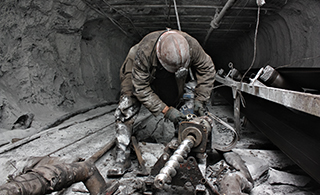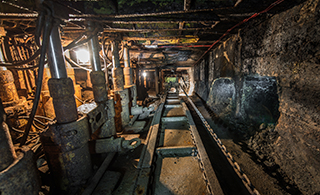 Government, Mining
Individual Consultant to undertake a holistic Study on Strengthening the Participation of Women in Uganda’s nascent Extractives Sector including in the Development Minerals sector
Government, Mining
Individual Consultant to undertake a holistic Study on Strengthening the Participation of Women in Uganda’s nascent Extractives Sector including in the Development Minerals sector
Individual Consultant to undertake a holistic Study on Strengthening the Participation of Women in Uganda’s nascent Extractives Sector including in the Development Minerals sector
Individual Consultant to undertake a holistic Study on Strengthening the Participation of Women in Uganda’s nascent Extractives Sector including in the Development Minerals sector has been closed on 18 Sep 2018. It no longer accepts any bids. For further information, you can contact the United Nations Development Programme
Bellow, you can find more information about this project:
Location: Nigeria
General information
United Nations Development Programme
Government
Mining
Closed
Timeline
12 Sep 2018
18 Sep 2018
Not available
Contacts
Description
Uganda is rich in natural resources and has a favorable geological environment that hosts over 27 different minerals including limestone, marble, stone aggregate, phosphate, sand, gold, tin, iron ore, dimension stone, clay, oil and natural gas among others. Mining offers a significant opportunity for the country; particularly as a source of employment, revenue, economic lifeline for industries and in contributing to social and economic development at local, national and sub-regional level. Nationally the mining industry is a key to attaining ‘Vision 2040’ and the National Development Plan II (2015/16 –2019/20).
Growth and development of the mining sector is guided by the Mining and Minerals Policy (2001), Mining Act 2003 and Mining regulations of 2004 among other regulatory and legal instruments. The Government of Uganda recognizes the importance of the Minerals sector to the economy. Under the current Mineral Policy of Uganda (2001) the government acquired good quality geological data and established infrastructure for its management; restructured and strengthened institutional capacity; and registered improved livelihoods, increase in employment and revenues accruing from mineral resources. The Government of Uganda is, with the support of development partners, reviewing the policy and legal institutional framework of the mining sector. The ACP Group of States, the European Commission and UNDP are at the forefront in providing technical and advisory support for the review through the ACP-EU Development Minerals Programme.
Uganda’s new Minerals and Mining Policy (2016) corroborates geo-data on resource estimation indicating that Uganda has abundant mineral resource reserves for world class economic mineral deposits. Previously overlooked resources such as sand, clay and stone have taken center stage for their ability to create employment, drive national and local economic growth and reduce poverty. Discoveries of copper, nickel, gold, chromite, iron ores, tin, tantalite, tungsten, limestone, marble, graphite and gemstones have also been made. These resources have attracted increased Foreign Direct Investment (FDI) in the sector from US$5 million in 2003 to over US$ 800 million in 2017.
Furthermore, currently, the mining sector contributes 0.3% percent to Gross Domestic Product (GDP) per annum compared to an annual growth rate of 10.9%. This is expected to increase to seven percent (7%) by 2020 according to the National Development Plan (NDP) II (2015-2020) and Vision 2040 towards achievement of the Middle-income status.
However, the Minerals sector has continued to face challenges of low funding; in-adequate institutional capacity to manage the mineral resources; in-ability to undertake significant value addition to minerals; the complex nature of artisanal and small -scale mining; potential for conflicts and environmental degradation. Furthermore, despite the sector’s current and projected growth, underlying drivers of gender inequality and equity imbalances have resulted in socio-economic disparities among men and women, which in turn negatively impact livelihood and other socio-economic outcomes for women and men. While a significant number of women derive their livelihood from artisanal and small-scale mining (ASM), little is known about the socio-economic impact, including gender dimensions of ASM and its potential to promote or hinder women’s economic empowerment. Policies aimed at formalization and regularization of the sector are thus unfolding without sufficient analysis of how women, in ASM, will be impacted.
There is also demonstrable limited technical and operational capacity within the institutional framework to effectively implement gender mainstreaming interventions – a factor that has exacerbated the income disparities between men and women; and undermined socio-economic transformation in the Mining sector. Also, the informal nature of most mining operations has augmented the vulnerabilities uniquely experienced by women especially regarding access to and control over economic resources such as land, capital, technologies and bargaining power as well as socio-cultural restrictions that impede their ability to exercise their voice and agency in the sector.
Thus, despite having a strong presence at artisanal sites, there are much fewer women than men in ownership, decision-making and leadership positions at ASM sites, points of sale and SMEs operating in the sector. This reality has largely undermined the potential for optimal benefit from the sector and compounded the socio-economic constraints that have led to gender-related barriers to wealth creation, inclusive growth and sustainable development. There is thus need for urgent action to position women to equitably derive optimal benefit from Uganda’s mining sector.
In this regard, UNDP is seeking the services of a qualified international consultant to undertake a study on Strengthening the participation of women in artisanal and small-scale mining (ASM) with special focus on the Development Minerals sector. The study is intended to generate reliable data on women and artisanal and small - scale mining in Uganda. The data is intended to inform actions of stakeholders responsible for the formulation and implementation of Uganda’s Mining Code, as well as various stakeholder actions at community, sub-national and national level. The draft Study Report is expected to be reviewed and validated in a National validation workshop with key stakeholders during the assignment; before finalization.
Receive Daily Tenders and Grants notifications
Subscribe nowFeatured tenders
-
 Tender
22 Aug 2018
Nigeria
Firm to Undertake Analysis and Development of Knowledge Products for the Development Minerals Sector in Uganda: Minimum Operating Standards Toolkit for Safety, Health and Environmental Management and Conflict Sensitive Community Engagement Toolkit
United Nations Development Programme
Tender
22 Aug 2018
Nigeria
Firm to Undertake Analysis and Development of Knowledge Products for the Development Minerals Sector in Uganda: Minimum Operating Standards Toolkit for Safety, Health and Environmental Management and Conflict Sensitive Community Engagement Toolkit
United Nations Development Programme
-
 Tender
27 Apr 2022
Nigeria
Nigeria: Mineral Sector Support for Economic Diversification Project (MinDiver)
Mineral Sector Support for Economic Diversification
Tender
27 Apr 2022
Nigeria
Nigeria: Mineral Sector Support for Economic Diversification Project (MinDiver)
Mineral Sector Support for Economic Diversification
-
 Tender
22 Apr 2022
Nigeria
Request for Quotation - Stone Crusher Equipment
United Nations Development Programme
Tender
22 Apr 2022
Nigeria
Request for Quotation - Stone Crusher Equipment
United Nations Development Programme
-
 Tender
08 Apr 2022
Nigeria
Nigeria: Mineral Sector Support for Economic Diversification Project (MinDiver)
Mineral Sector Support for Economic Diversification
Tender
08 Apr 2022
Nigeria
Nigeria: Mineral Sector Support for Economic Diversification Project (MinDiver)
Mineral Sector Support for Economic Diversification
-
 Tender
21 Jul 2021
Nigeria
CALL FOR PROPOSALS
United Nations Development Programme
Tender
21 Jul 2021
Nigeria
CALL FOR PROPOSALS
United Nations Development Programme
Get free access to our Tenders & Grants Database
Our service is free of charge and will always be
Join NowDonors
-
 COMPETITIVENESS AND INNOVATION FRAMEWORK PROGRAMME (EUROPEAN COMMISSION)
COMPETITIVENESS AND INNOVATION FRAMEWORK PROGRAMME (EUROPEAN COMMISSION)
-
 EURASIAN DEVELOPMENT BANK
EURASIAN DEVELOPMENT BANK
-
 EUROPEAN INVESTMENT BANK
EUROPEAN INVESTMENT BANK
-
 BILL & MELINDA GATES FOUNDATION
BILL & MELINDA GATES FOUNDATION
-
 INTERNATIONAL PLANNED PARENTHOOD FEDERATION SOUTH ASIA REGION
INTERNATIONAL PLANNED PARENTHOOD FEDERATION SOUTH ASIA REGION
-
 ISLAMIC DEVELOPMENT BANK
ISLAMIC DEVELOPMENT BANK
-
 NORDIC DEVELOPMENT FUND
NORDIC DEVELOPMENT FUND
-
 PACIFIC ISLANDS FORUM SECRETARIAT
PACIFIC ISLANDS FORUM SECRETARIAT
-
 SWEDISH INTERNATIONAL DEVELOPMENT AGENCY
SWEDISH INTERNATIONAL DEVELOPMENT AGENCY
-
 WORLD HEALTH ORGANIZATION
WORLD HEALTH ORGANIZATION